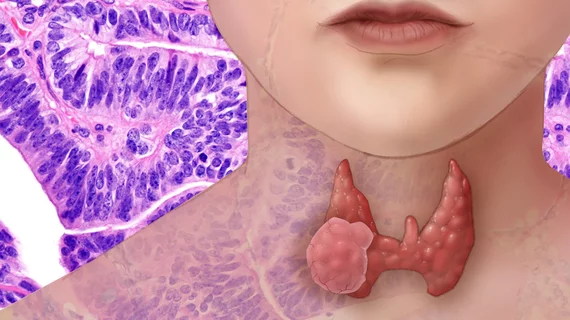AI could help diagnose thyroid nodules
The combination of machine learning and ultrasound could help healthcare providers with the diagnosis of thyroid nodules, according to new findings published in JAMA Otolaryngology.
When thyroid nodules are evaluated, using ultrasound, biopsy and fine-needle aspiration (FNA) are often the next steps. Molecular testing is yet another option. But could AI play a key role in risk stratification for these patients? That’s exactly the question researchers wanted to explore.
“Machine learning is a low-cost and efficient tool that could help physicians arrive to a quicker decision as to how to approach an indeterminate nodule,” co-author John Eisenbrey, PhD, associate professor of radiology at Thomas Jefferson University in Philadelphia, said in a prepared statement. “No one has used machine learning in the field of genetic risk stratification of thyroid nodule on ultrasound.”
The study’s authors trained an algorithm with imaging findings from 121 patients who underwent both ultrasound-guided fine needle-biopsy and molecular testing. Machine learning helped the algorithm “learn” what to look for when evaluating thyroid nodules and was able to achieve a specificity of 97%, predictive positive value of 90% and accuracy of 77.4%.
“This was such an important collaboration of surgeons and radiologists, and there's already interest from other institutions to pool our resources,” said co-author Elizabeth Cottrill, MD, also of Thomas Jefferson University. “The more data we feed the algorithm, the stronger and more predictive we'd expect it to become.”
Eisenbrey added that the researchers are already looking ahead to how they could improve this work in the future. They want to leverage feature extraction, for instance, to “help us identify anatomically relevant features of high-risk nodules.”

